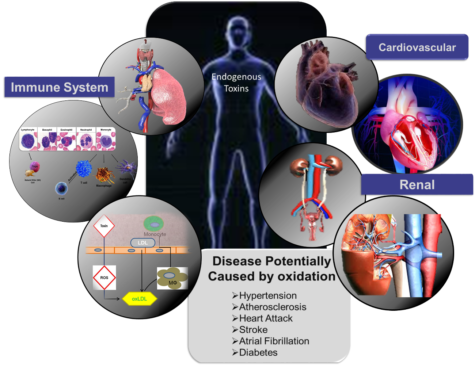
Cardiovascular disease (CVD) has been responsible for increased mortality and morbidity rates in our society for generation with no end in sight. There is a paradigmatic shift in medical practice as it pertains to treating CVD, rather than physicians and scientist looking at this as a single organ disease, we are now considering the pathophysiological condition to include genetic inheritance and lifestyle that imparts changes to the heterogeneity of molecular, cellular and organs systems.
It is well accepted that a number of risk factors contribute to the onset of CVD to include poor nutrition, lack of physical activity, hypertension, obesity, diabetes and certain forms of cancer. My research has focused on the role reactive oxygen species (ROS) have played on the onset on CVD due to increased vascular inflammation. ROS is a common term that is used to address the highly regulated enzymatic process that can be either antimicrobial or damaging to an organ system. Oxidative stress has been thought to be a balancing act between oxidants and antioxidants, but the mechanism of using high antioxidant foods have not rendered any changes in oxidative outcomes. There is new research that is being conducted by Cortese-Krott et al. (2017) that is identifying a new and integrative biology concept known as redox regulation. In their study, they have defined various chemical interactions of reactive sulfur species, reactive nitrogen species, and ROS along with downstream biological targets as reactive species interactome (RSI). This group suggest RSI serves to sense multiple stressors and adjust metabolic needs accordingly. This model identifies thiols as an important source of ROS in addition to the cysteine redox switches.
More research is necessary to determine whether efficiency of these new developments; however, we cannot evade the concept of ROS leading to an enhanced immune response that contributes to the disease process. It is my opinion, that this new development will open a new mechanistic pathway to understand the pathophysiology that leads to CVD and increase the intersystemic approaches that are used to treat the chronic inflammatory response that leads to CVD.

Anberitha Matthews, PhD is a Postdoctoral Fellow at the University of Tennessee Health Science Center in Memphis TN. She is living a dream by researching vascular injury as it pertains to oxidative stress, volunteers with the Mississippi State University Alumni Association, serves as Chapter President and does consulting work with regard to scientific editing.